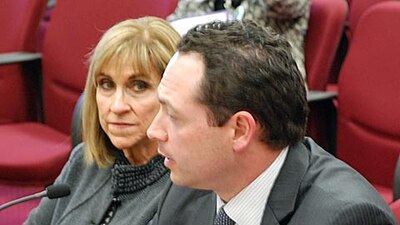School finance challenges were top of mind when the Education Leadership Council convened this week.
The council, set up two years ago to advise Gov. John Hickenlooper on education issues, is fairly low profile but includes some individually high-profile education and business leaders.
The council met Wednesday for the first time since February, and key topics for discussion were the pending overhaul of the state’s school finance system (Senate Bill 13-213) and the tax increase that will be needed to pay for it.
The civic group Colorado Forum has filed 16 variations of a ballot measure to fund SB 13-213 but hasn’t yet announced which version it will propose to voters. Putting a measure on the November ballot will require gathering 86,105 signatures by Aug. 5. (See this story for more about the debate on the proposals and this summary of the various plans.)
“I’m hearing the business community is waffling” on the ballot measure, said council member Barbara Grogan, former CEO of Western Industrial Contractors and now a member of several foundation boards, including the Denver Scholarship Foundation. “It gives me a real pain in my belly.”
Sen. Mike Johnston, D-Denver, said, “There’s now near-major universal agreement on the policy” contained in SB 13-213. But he acknowledged that two major business groups, the Denver Metro Chamber of Commerce and Colorado Concern, prefer a flat percentage increase in the income tax for all taxpayers. Several other groups lean toward a two-step plan that would impose a higher percentage increased on people who earn more than $75,000 a year.
“The [polling] data suggests it’s much harder to pass a flat tax,” Johnston said, raising the question of whether it’s better to appeal to voters or appease parts of the business community.
Members chew on Lobato ruling
The council met a day after the Colorado Supreme Court ruled the state’s current finance system is constitutional, and members had varying views on how that might impact the ballot measure. (Read this EdNews story on court ruling.)
Lt. Gov. Joe Garcia, who chairs the group, said he’s concerned the public might interpret that ruling as meaning the present system is sound.
Metro State University President Steve Jordan said the court ruling “makes a more difficult starting point.”
Johnston said, “I think it adds urgency to the ballot issue. … It dramatically increases the urgency to build a coalition.”
Others were more optimistic.
Council member Mark DeVoti, superintendent of the small Archuleta School District, said, “I don’t think yesterday’s decision was a game stopper.”
Mike Martin, chancellor of the Colorado State University System, said the ballot measure “is about as good a shot as you’re ever going to get” to increase school funding.
Amendment 23 tinkering debated
One variation of the proposed ballot measures would make significant changes in Amendment 23, the 2000 constitutional provision that requires K-12 spending to increase annually by enrollment and inflation and that funnels a portion of income tax revenues into a dedicated education fund.
That variation would eliminate the inflation/enrollment escalator and instead dedicate about 43 percent of the state’s general fund to K-12 every year.
Johnston and Sen. Evie Hudak, D-Westminster and chair of the Senate Education Committee, was concerned about losing the inflation factor, and she and Johnston sparred a bit over that.

Tony Salazar, executive director of the Colorado Education Association, weighed in on Johnston’s side, saying, “Amendment 23 has outlived its useful life, and it’s time to move on.”
Salazar also called the A23 change “a way to help higher education” because it could free up more funding for programs other than K-12.
Jordan sounded skeptical. “Maybe, maybe,” he said.
Building public support
Other issues worried council members beyond ballot measure language.
Ken DeLay, executive director of the Colorado Association of School Boards, warned that SB 13-213 itself “remains controversial in the K-12 community.”
Garcia said, “I’m worried” about ambivalent people in business, K-12 and higher education. “They have to really be onboard.”
“I think they’re going to be there,” DeLay said, noting that people who pinned their hopes on a different decision in Lobato v. State should get behind the ballot measure.
“Neutral is against,” said Grogan. “We need to get this moving. … We don’t have time to study. The time is right now.”
“There is an urgency to building the coalition, and that is happening,” Johnston said.
Ballot measure variations
The Colorado Forum proposals come in four flavors: A two-step increase, a flat increase of .72 percent and two sets of five-tier increases.
The two-step tax would raise the least amount of revenue at 950.1 million. The across-the-board .72 percent increase would raise an estimated $927.7 million, while the variations of five-step increases would raise $1.07 billion and $1.16 billion.
In addition to the four different tax increases, the Forum proposals also include four variations of tax policy changes. Those include:
- A combination proposal that includes repeal of the current constitutional requirement for automatic increases in base school funding (Amendment 23) and replacing it with a provision earmarking about 43 percent of annual state general fund spending for schools. The combination plan also changes the Gallagher Amendment, which governs local property taxes, to set a floor on the valuation of residential property for the assessment of school taxes.
- A version that includes just the Amendment 23 changes.
- A version that includes only the Gallagher changes.
- No change in either constitutional provision.
Colorado Forum director Gail Klapper told EdNews recently that opinion seems to swinging toward a two-step increase combined with changes in A23, but that there’s been more debate over including the Gallagher changes in the final version.
